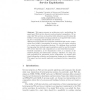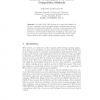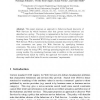EUROMICRO
2003
IEEE
14 years 5 months ago
2003
IEEE
A Web service is frequently defined as browser-less access to content on a Web site. The industry’s focus to date has been on providing easy-to-use low-level libraries, tools a...
WAIM
2004
Springer
14 years 5 months ago
2004
Springer
This paper presents an architecture and a methodology for agent-based Web service discovery and automated composition. We assume that Web services are described with declarative sp...
TES
2004
Springer
14 years 5 months ago
2004
Springer
Web services represent the latest effort of the information technology industry to provide a framework for cross enterprise automation. One principal characteristic of this framewo...
SEMWEB
2004
Springer
14 years 5 months ago
2004
Springer
Successful employment of semantic web services depends on the availability of high quality ontologies to describe the domains of these services. As always, building such ontologies...
SEMWEB
2004
Springer
14 years 5 months ago
2004
Springer
In today’s Web, Web services are created and updated on the fly. It’s already beyond the human ability to analysis them and generate the composition plan manually. A number of...
SEMWEB
2004
Springer
14 years 5 months ago
2004
Springer
Web services are in the midst of making the transition from being a promising technology to being widely used in the industry. However, most efforts to use Web services have been m...
SEMWEB
2004
Springer
14 years 5 months ago
2004
Springer
Service interface description languages such as WSDL, and related standards, are evolving rapidly to provide a foundation for interoperation between Web services. At the same time,...
SEMWEB
2004
Springer
14 years 5 months ago
2004
Springer
Abstract. Hierarchical Task-Network (HTN) based planning techniques have been applied to the problem of composing Web Services, especially when described using the OWL-S service on...
SEMWEB
2004
Springer
14 years 5 months ago
2004
Springer
Abstract. The shift from Web pages to Web services enables programmatic access to the near limitless information on the World Wide Web. Autonomous agents should generate concise an...
INTELLCOMM
2004
Springer
14 years 5 months ago
2004
Springer
This paper proposes an approach to behaviour-based discovery of Web Services by which business rules that govern service behaviour are described as a policy. The policy is represen...



